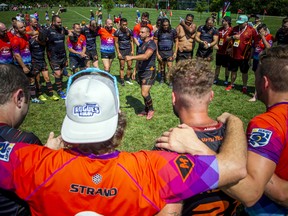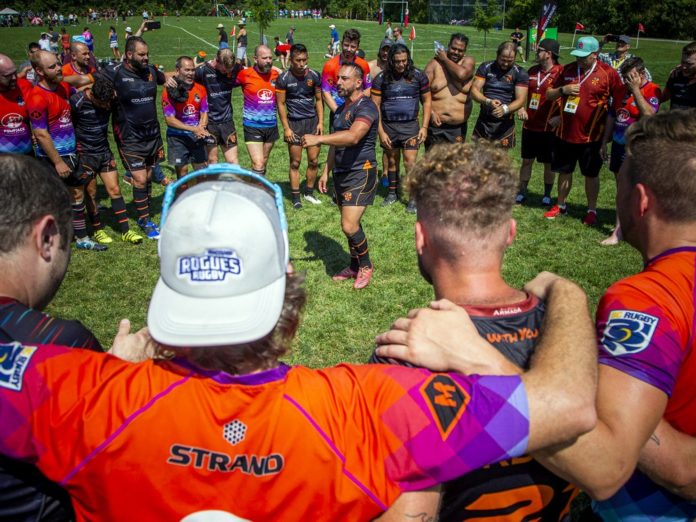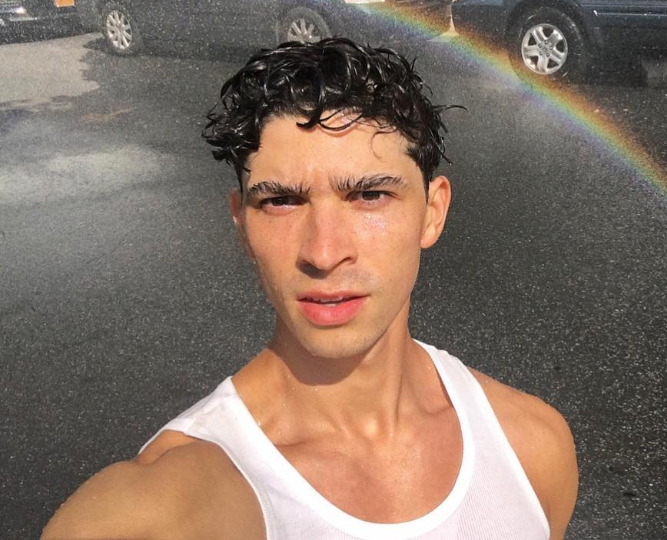“Yes, you beat each other to a pulp on the field, but you know they’re exactly the same as you. You make each other better.”

Article content
The sweat — and blood — was still dripping after the San Diego Armada crunched the Vancouver Rogues 28-7 in Bingham Cup rugby play when Armada captain Fabiano Sarmento gathered both sides to the centre of the pitch.
Advertisement 2
Story continues below
Article content
Inside the circle of players, their arms draped over each others’ shoulders in solidarity, Sarmento delivered a raw and emotional tribute to the vanquished Vancouverites.
“You never stopped coming for us. You always tried to win. And you stuck together,” he shouted. “Hell, yeah!”
It was an exceptional moment at an exceptional tournament featuring the world’s best gay and inclusive rugby teams.
Established in 2002 and named in honour of Mark Kendall Bingham, a gay rugby player who helped overpower the hijackers aboard United 93 on Sept. 11, 2001, the Bingham Cup has grown to be the largest amateur rugby tournament in the world. The 2022 tournament is hosted by the Ottawa Wolves and this marks the first time it has taken place in Canada. Approximately 150 teams from 20 countries are represented at the tournament, which wraps up Sunday at the Hornets Nest in Gloucester.
Their common cause? A safe and inclusive competition for men — most of whom are gay — and women — most of whom are not — without the toxic homophobia or sexism that plagues many sports.
Rugby would seem to be an unlikely sport to embrace gay players and inclusiveness, but that’s the point, says Erik Denison, an author and researcher on homophobia and sexism in sports at Australia’s Monash University.
“Rugby is one of the most violent sports and it’s one of the most hyper-masculine sports, and I think that’s why it realized it needed to change,” Denison said. “It had to change its brand, and I think that is what created the need for something like the Bingham Cup and gay rugby.”
Advertisement 3
Story continues below
Article content
Young athletes who come out as gay are more likely to be targeted by homophobia, Denison said. One in four have attempted suicide.
Female rugby players have the opposite problem, he said. Most people assume members of the women’s teams are all lesbians when only about 16 per cent of female players are gay. Welcoming the women is part of the tournament’s inclusiveness.
Vancouver Rogue player Patrick Milford, 37, was the only openly gay rugby player in Canada when he came out as gay in his early 20s. A national champion weightlifter when he was younger, the native of Nanaimo, B.C., said he struggled as a closeted teenager.
“I definitely over-compensated by being the macho person,” Milford said. “I was a wrestler, weightlifter, a rugby player … I put up that veneer to be as masculine as I possible could.”
Advertisement 4
Story continues below
Article content
Now he tries to set an example as a role model by being as visible as he can as a gay rugby player. He played on the weekend despite having “a bit of a broken rib.”
“I coach a lot of high school rugby and I have a lot of experience with kids getting bullied and quitting the sport because they weren’t able to be themselves,” he said. “There are a lot of kids who struggled and came out after they left rugby, and that kind of broke my heart, knowing that they’d had the same experience I’d had.”
Milford said his Nanaimo teammates were incredibly supportive when he came out. Nevertheless, he supports a “Better the Banter” campaign to eliminate homophobic slurs in the game.
“It’s OK to give people s—,” he said with a laugh. “But call someone an a–hole. Don’t call him a f—-t.”
Advertisement 5
Story continues below
Article content
After their loss to the Armada on Saturday, the Rogues were to play in a consolation game, while the Armada were to match off Sunday for the Bingham Plate, the top prize in the tournament’s second tier.
For the Armada’s massive Chris Biggs, 49, it was his third Bingham Cup. The sport, he said, is all about “brotherhood,” and he, too, sees himself as a role model for younger gay men.
“I get chills thinking about it. Showing someone you have a safe space to go to, you have a brotherhood where you’re included, you’re appreciated and accepted for who you are, it’s so important,” Biggs said.
Added Sarmento, the San Diego captain: “It’s a sport that we play very hard. It demands a lot of the body and the mind. Yes, you beat each other to a pulp on the field, but you know they’re exactly the same as you. You make each other better.
“I don’t care who you are. If you play my crazy sport, you’re my family.”









